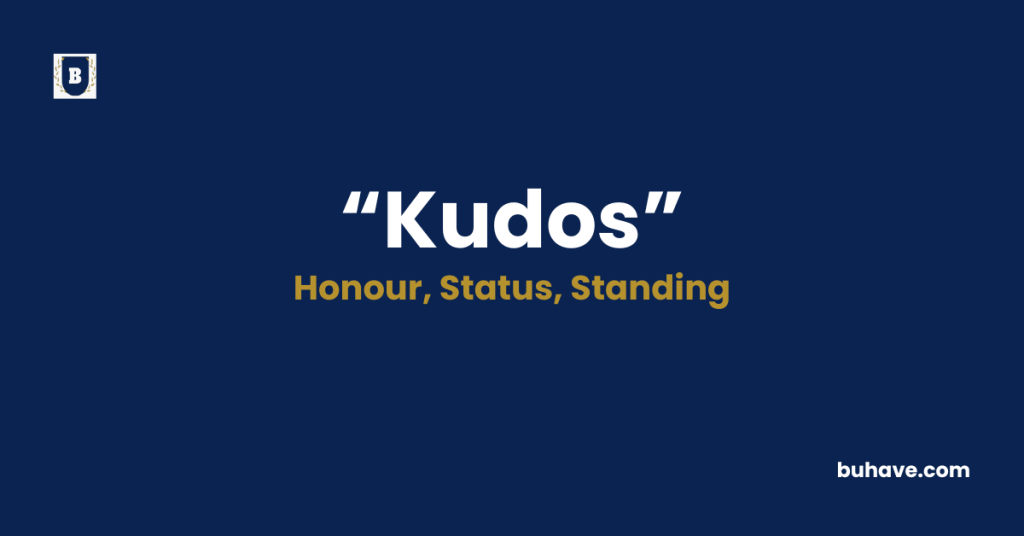The word ‘Kudos’ (Noun) describes Kudos as giving respect, honor, or congratulations to someone for a job well done. First of all, kudos show appreciation for effort and success. in this guide, you’ll learn the full definition, synonyms, antonyms, etymology, and real-life examples of how to use ‘Kudos’ correctly in sentences.
Kudos Explained in Depth
A complete and detailed guide to the words Kudos including meaning, definition, examples, etymology, synonyms, and antonyms.
Meanings of Kudos
Kudos means praise, honor, or recognition given for someone’s achievement or good work.
it is a word used to show respect, honor, or congratulations to someone for doing something well. It expresses appreciation for a good action, achievement, or effort. When someone receives kudos, it means they are being recognized and valued for their success. Words similar to kudos include praise, respect, credit, recognition, congratulations, and admiration.
Giving kudos helps to encourage and support positive actions in people, making them feel proud and motivated.
Definition:
Kudos is a noun that means praise, recognition, or honor given to someone for an achievement or a job well done. It is often used to express approval
Kudos is giving respect, honor, or congratulations to someone for a job well done. First of all, kudos shows appreciation for effort, success, or good behavior. Moreover, it highlights the value of hard work and encourages positive actions. In addition, kudos builds confidence and strengthens relationships between people. Similar words for kudos include praise, respect, credit, recognition, congratulations, admiration, and appreciation.
Therefore, when people offer kudos, they create an environment of support, encouragement, and motivation.
Etymology:
The word kudos comes from the ancient Greek word “kydos,” which means glory, fame, or honor. First of all, the Greeks used “kydos” to describe the respect a hero earned after great achievements. Later, English speakers adopted the word “kudos” in the 18th century, keeping its meaning of praise and honor. Moreover, although “kudos” looks like a plural word because of the “s” at the end, it actually stays singular in English. In addition, many people use it today to recognize success, hard work, or good ideas.
Therefore, the history of “it” shows how a powerful idea of respect traveled from ancient times into modern language. Finally, understanding its journey makes giving it feel even more meaningful.
Example Sentence:
- First of all, kudos goes to the team for finishing the project ahead of schedule.
- Moreover, she earned kudos from her classmates because she helped everyone understand the assignment.
- In addition, the coach gave kudos to the players who showed great effort during practice.
- As a result, the company awarded kudos to employees who improved customer service.
- Finally, he deserves kudos for staying calm and solving the problem under pressure
Kudos Synonyms:
- Praise
- Honor
- Respect
- Recognition
- Credit
- Glory
- Congratulations
- Admiration
- Applause
Kudos Antonyms:
- Criticism
- Insult
- Blame
- Disrespect
- Dishonor
- Shame
- Condemnation
- Reproach
- Scorn
- Disapproval
FAQs about Kudos
Here’s a FAQ-style guide about the word “Kudos”
1. What does “kudos” mean?
Kudos is a noun that means praise, recognition, or acclaim for an achievement or good work. It’s used to acknowledge someone’s success or effort.
2. Is “kudos” singular or plural?
Despite ending in “-s,” kudos is singular. It comes from Greek, where it is a singular noun meaning “glory” or “renown.”
Correct: “Kudos is well deserved.”
Incorrect: “Kudos are flowing in.”
3. How do you use “kudos” in a sentence?
- “Kudos to you for finishing the project ahead of schedule!”
- “She deserves kudos for her leadership.”
- “He received a lot of kudos after his presentation.”
4. Can “kudos” be used in formal writing?
Yes, though it’s slightly informal or conversational. In more formal contexts, you might use words like praise, acclaim, or recognition instead.
5. Is there a plural form of kudos?
No “kudos” is already a singular, uncountable noun. You wouldn’t say “three kudos” or “many kudoses.” Instead, use phrases like:
- “A lot of kudos”
- “Plenty of praise”
6. What’s the difference between kudos and compliments?
- Kudos usually refers to recognition of a specific achievement.
- Compliments can be more general, like praising someone’s appearance, personality, or skills.
7. Where does the word “kudos” come from?
It originates from the Greek word “kydos” (κῦδος), meaning glory or fame. It entered English in the 19th century, especially in academic and journalistic circles.
8. Can I give someone kudos online or in messages?
“Kudos” is commonly used in emails, chats, and on social media to acknowledge someone’s contribution, effort, or success.
Explore more K words:

















